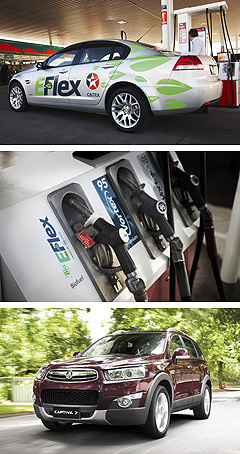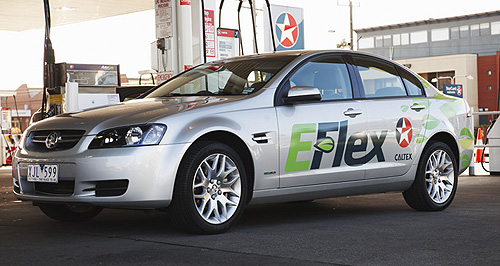Make / Model Search
News - General News - FuelsBiofuels get no credit under federal revampNo credit: Holden’s FlexFuel Commodore is no greener when running on E85 ethanol, according to the proposed new-look Green Vehicle Guide. Ethanol to miss out on “special discount” for its green origins under new guide6 Aug 2012 BIOFUELS will not get special consideration under a proposed revamp of the federal government’s Green Vehicle Guide next year, with officials citing a lack of objective evidence that such fuels are more environmentally friendly than petrol, diesel or liquid petroleum gas. Instead, fuels such as ethanol and biodiesel used in vehicles such as the Holden Commodore and Captiva will continue to be rated for carbon dioxide emissions in the same way as fossil fuels, as grams of CO2 emitted per kilometre. The decision is outlined in a discussion paper on the proposed changes to the Green Vehicle Guide – the primary tool for car buyers to assess the environmental impact of vehicles – that are scheduled to go ahead on January 1. Under the revamp, the government is proposing to drop its green vehicle star rating system and instead use official carbon dioxide emission figures as its primary public ranking for the environmental credentials of cars sold in this country. The discussion paper was issued by the federal infrastructure and transport department last month, calling for comment from interested parties by the end of September. A previous attempt to revamp the guide was shelved last year after negative comment from key stakeholders on proposed changes outlined in a discussion paper issued in May last year.  From top: Holden Commodore E85 Caltex E-Flex bowser Holden Captiva. From top: Holden Commodore E85 Caltex E-Flex bowser Holden Captiva.This time, the motor industry is unhappy with what it sees as unnecessary haste to make the changes in a matter of months. The Federal Chamber of Automotive Industries told GoAuto that, while it supports the review of the Green Vehicle Guide, it needed more time to fully digest the implications of the proposed changes. “The discussion paper proposes a very short lead time with an introduction of any change from beginning of next year,” a spokesperson for the FCAI said. “The FCAI would encourage the government to review the proposed lead time to ensure that a full consultation process was undertaken to allow both industry and new car buyers sufficient time to understand any changes.” The spokesperson said the FCAI had had concerns with the outcomes of previous reviews of the guide, under which all existing results were re-rated, quite often with a short lead time. “This has resulted in confusion with both private new car buyers and also fleets who use a GVG rating as part of their purchasing criteria.” The guide was initiated in 2004, and updated in 2006. The latest proposed changes to the system would abolish the current star rating system that uses a number of yardsticks such as fuel consumption, CO2 emissions and toxic emissions to arrive at an environmental rating out of a possible five stars. While the guide will continue to provide a range of environmental measures, including fuel economy and air pollution rating, CO2 emissions provided by manufacturers in compliance with Australian Design Rule 81/02 will determine the overall ranking. The discussion paper says consumer awareness of CO2 measurement is growing, and will be strengthened by the introduction of mandatory CO2 emissions standards for new vehicles in Australia from 2015. The CO2 emissions measurement took into account the difference in CO2 emissions between fuels. “For example, a litre of diesel produces 2.7kg of CO2, compared with 2.3kg for a litre of petrol and 1.6kg for a litre of LPG,” the paper says. But the paper proposes to rule out any “special discounts” for fuels based on their origins. Proponents of biofuels – including GM Holden, whose Commodore is designed to run on E85 ethanol – say they are more environmentally friendly because they recycle biomass, either from garbage or from crops that will be re-grown, taking greenhouse gases out of the environment. However, the federal discussion paper says: “The lifecycle impacts of biofuels, as with all fuels, can vary considerably depending on how a particular fuel is produced. “For example, biofuels produced from land cleared to grow crops to produce biofuel feedstock would have more adverse environmental impacts than those produced from waste products that are purely incidental to food production. “The environmental impact of such fuels also depends on a number of factors, including availability, consumer awareness, vehicle capability, as well as cost relative to conventional fuels.” The problem for car-makers such as Holden is that vehicles running on E85 use more fuel, making the CO2 figure seem worse than rival fuels such as petrol. Rather than provide a “special discount” for such fuels, the federal department proposes greater prominence to a separate “transport fuel production” emissions figure for each vehicle, expressed in grams per kilometre. Under this system, biofuels would be rated a zero, while E85, which is 85 per cent ethanol and 15 per cent petrol, would be estimated on the 15 per cent petrol component. This system is already available on the site, but requires a special search. Under the website rebuild, it would be brought up alongside the fuel consumption reading and other figures. The “transport fuel” rating includes a ranking for electricity, but it depends on the state in which the vehicle is to be garaged. Under the fuel consumption and CO2 emissions fields, electric vehicles will continue to be ranked ‘0’, for zero emissions, but they will be subject to three measurements – energy consumption (in Watt-hours per kilometre), range in kilometres, and fuel production CO2 emissions (g/km). The latter will depend on the state in which the vehicle is to be garaged. For example, a Nissan Leaf in Victoria is rated as 237g/km, due to a high percentage of brown coal used in electricity generation, while in Tasmania it is listed at just 61g/km, due to the high use of hydro-electric generation. In the United States, the Environment Protection Authority measures EV electricity use in MPGe – a formula that attempts to equate electricity with petrol in a “miles per gallon equivalent”. That system is aimed at making it easier for vehicle buyers to compare fossil-fuel cars with electric or hybrid vehicles. GoAuto understands several motoring industry organisations, including the FCAI, are likely to make submissions on the proposals.  Read more |
Click to shareGeneral News articlesResearch General News Motor industry news |












Facebook Twitter Instagram